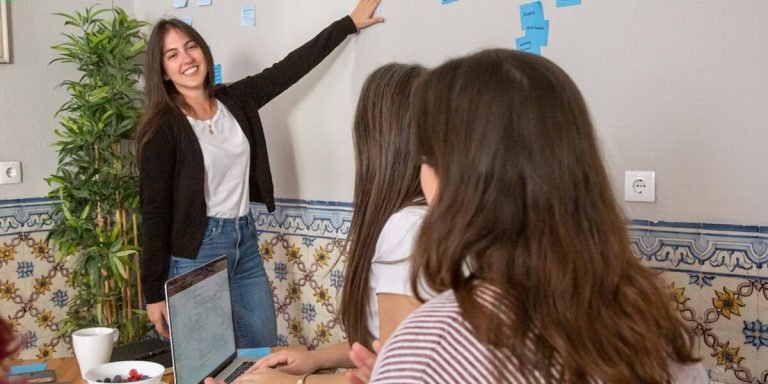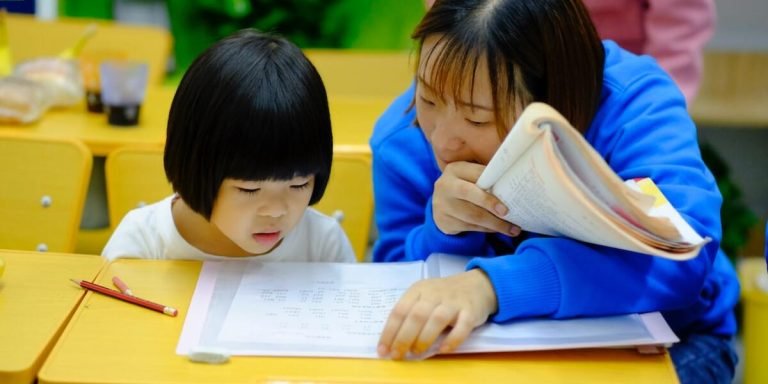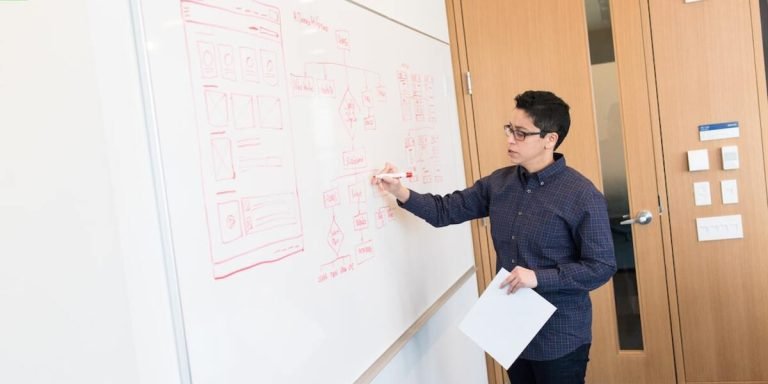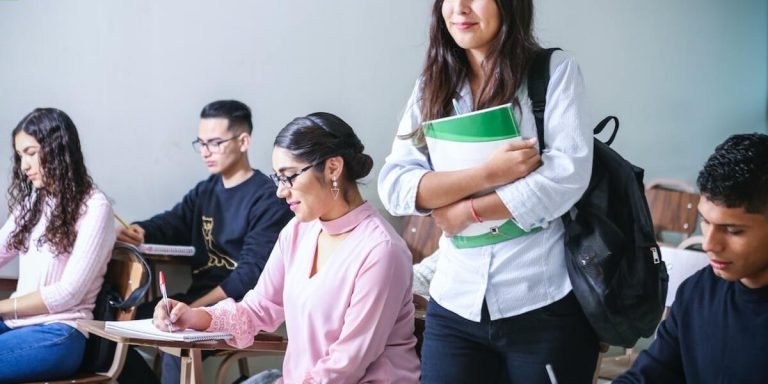Teacher AI: Transforming the Future of Childhood Education
The advent of artificial intelligence, particularly “Teacher AI,” is swiftly revolutionizing the landscape of childhood education. It’s providing educators and parents with innovative tools to enhance learning experiences for children, integrating seamlessly into existing curriculums and home environments alike.
This transformational technology augments traditional teaching methods by bringing adaptive learning strategies straight to our classrooms and homes. For parents and educators striving to provide optimal support for young learners in an increasingly digital world, understanding how Teacher AI impacts childhood education is crucial.
Did you know?
According to Stanford University, AI can provide individualized learning pathways for students by adapting in real-time to their unique needs – a resource that may revolutionize early childhood education.
The Role of Teacher AI in Enhancing Parental Engagement
Expanding the role of artificial intelligence in classrooms goes beyond academic purposes. The integration of Teacher AI, a new generation tech-enhancement, has proven to be an efficient tool in bridging communication gaps between schools and homes. Today’s parents demand transparency from the institutions responsible for molding their children’s intellects and personalities.
Herein lies the instrumental role that teacher AI plays.
As we continue marching into 2023 with advancements aplenty, Teacher AI is set to change engagement dynamics within educational spaces comprehensively. Bringing about real-time data sharing processes across digital platforms ensures parents are never left questioning their child’s progress or classroom wellbeing again. Implementing smart algorithms can successfully simulate human interaction patterns offering analysis on attendance records, assignments submissions even behavioral insights – all made conveniently accessible via mobile phones or computers.
These intelligent systems empower educators by providing tailored tips based on individual students’ performance metrics. They use predictive analytics to facilitate early detection of red flags, such as a drop in grades that may indicate bigger issues. While technology may not entirely replace the human touch soon, it offers extraordinary potential when combined with other strategies like personal meetings and parent-teacher conferences. This combination establishes strong home-school connections and fosters parental engagement, significantly enhancing the early childhood education ecosystem.
Utilizing Teacher AI for Effective Parent-Teacher Communication
In the rapidly evolving education landscape, Teacher AI holds a prominent place in fostering stronger connections between parents and educators. Its application not only simplifies learning but also accelerates effective parent-teacher communication.
The first step towards leveraging teacher AI is understanding its capacity to furnish personalized updates about each child’s educational progress. It can track an individual’s class performance, engagement levels, assignment submission patterns etc., providing rich data for teachers to share during discussions with parents.
Next comes facilitating real-time conversations. Before teacher AI came into play, scheduling appointments often proved challenging due to conflicting schedules of busy working parents and teachers juggling various responsibilities. With this technology-integrated approach now it’s possible for these vital interactions to take place without geographical or temporal restrictions.
Perhaps one of the most important aspects where we see technological pawprints is in addressing language barriers that previously hindered smooth dialogue between non-native English speaking families and schools staffs; through instant translation features offered by some advanced bots allows seamless cross-language communication ensuring all parties are on same page regarding children’s academic journey.
Lastly, using predictive analysis capabilities of big data analytics: AIs can help unearth underlying trends or issues that may affect learners’ development thereby preventing them from escalating unexpectedly at latter stages which was somewhat unimaginable before such tech integration occurred circa 2023 era.
How Artificial Intelligence Systems Support Parents in Student Learning
Artificial intelligence (AI), specifically Teacher AI, is swiftly transforming the educational landscape in ways unprecedented. Beyond increasing efficiency and enhancing learning outcomes for students, it’s also carving out a pivotal role – supporting parents in student learning.
As virtual mentors who never tire or rest, teacher AIs are now redefining parental engagement. They step up to bridge gaps between home and school— allowing parents to participate more effectively in their child’s education journey while ensuring nothing slips through cracks unnoticed.
To start with, these intelligent software systems provide round-the-clock access to key information about children’s academic progress. Using insightful dashboards that update real-time data as kids learn at different paces from anywhere anytime — be it test scores, assignment status or problem areas — they keep families ‘in loop’. Involved parents better understand what’s going on at the point of instruction which leads towards constructive conversations back home; aiding overall comprehension.
Moreover, such platforms often come equipped with communication tools enabling seamless dialogues among teachers-parents-students triad fostering collaboration which is crucial today when asynchronous online classes continue further blurring traditional boundaries amidst ever-evolving pandemic restrictions imposed by health emergencies worldwide like Covid-19 since 2020 till this year 2023!
Innovative Approaches to Educator Assistance Through Teacher AI
“The landscape of education is continuously evolving, with new developments focused on making teaching not just efficient but also effective. In today’s digital age, Teacher AI has emerged as a game-changer in this regard – an innovative approach that provides educators the assistance they need to optimize learning outcomes for children.
Teacher AI plays a critical role by bridging gaps often witnessed between technology integration and traditional educational methodologies. More than merely being integrated into curricular setups, it acts as an excellent tool supporting teachers’ decision-making process while implementing personalized pedagogical strategies for each child. It uses data-based analytics to understand how different learners respond and thereby promotes adaptive instruction practices designed around specific needs.
Parental involvement remains pivotal in achieving improved childhood education; however, understanding complex technological tools like Artificial Intelligence (AI) can be challenging for many parents. This is where Teacher AI shines again: simplifying technical complexities so parents are better equipped to support their child during remote or blended learning scenarios prevalent owing to ongoing pandemic conditions worldwide.
Streamlining Lesson Planning and Curriculum Development with AI Tools
As we delve deeper into the 21st century, “teacher ai” or artificial intelligence in education is revolutionizing not just how students learn but also remarkably enhancing teacher’s efficiency. One of pioneering ways teacher AI tools are being utilized is to streamline lesson planning and curriculum development.
AI-powered platforms such as Carnegie Learning’s MATHia and McGraw Hill’s ALEKS automatically generate personalized learning paths for each student based on initial assessments and ongoing performance data offering tailored instruction that addresses individual learning gaps effectively thus reducing redundancies in teaching. As these sophisticated algorithms continuously monitor a learner’s progress, they provide real-time feedback which can be integrated into future lesson plans ensuring no child is left behind acadically.
Furthermore, curriculum development – traditionally seen as the lengthy process of setting educational goals- can now be achieved more efficiently using AI tools like IBM Watson Element App . It supports educators by providing insights about students’ inclinations towards specific areas of study even before they have started with subjects enabling informed decision-making during course creation processes.
The use of teacher AI doesn’t end here! These smart systems offer unlimited opportunities for collaborative work between teachers globally breaking down geographical limitations fostering shared knowledge experiences resulting optimal outcomes learners while facilitating professional growth among faculty members themselves!
Enabling Real-Time Classroom Management Assistance via Intelligent Platforms
With the passing years, technology has made significant strides and continues to evolve at an unprecedented pace. As of 2023, one such innovation that holds incredible potential in transforming childhood education is Teacher AI – artificial intelligence systems specifically designed for educational support.
The concept behind teacher AI revolves around creating intelligent platforms capable of providing real-time classroom management assistance. With the implementation of these advanced technical tools, both parents and educators can now enjoy greater insight into children’s learning process while also enhancing their teaching capabilities.
Teacher AI performs a myriad array of functions like tracking students’ progress automatically, identifying areas where improvement is necessary as well as suggesting personalized strategies catered towards individual student needs. Its intricately designed algorithms analyze data from various sources (like quizzes or assignments) to provide useful insights on each child’s strengths and weaknesses.
But its utility extends beyond mere academic aid; many teacher AIs are equipped with features for session scheduling and attendance recording which significantly simplifies administrative tasks thus enabling educators more time focusing on lesson plans rather than desk work.
Furthermore through parent portals incorporated within these platforms; parents have easy access not only to grades but moreover detailed reports outlining how well their ward performed across varying subjects over different periods. This bridges gaps between home-school communication making involvement easier yet effective.
Measuring the Impact of Teacher AI on Student Success Collaboration
As we navigate the digital age, Artificial Intelligence (AI) is gradually becoming a significant part of our everyday lives. In particular, its influence and potential in childhood education are astounding—and one area where it’s showing great promise lies with Teacher AI.
Teacher artificial intelligence tools have been designed to support educators in their teaching practices—enhancing student learning experiences and outcomes. These tools can provide personalized content for each learner by adapting to their unique abilities or studying patterns; they also save teachers considerable time by automating administrative tasks such as grading papers.
Moreover, these advanced technologies offer possibilities for increased collaboration between students—a crucial factor when discussing academic success. With teacher AI assisting on both individualized instruction and group work facilitation levels, students’ cooperative skills get significantly strengthened- an essential skill needed not just acadically but life overall.
Measuring the impact of this technology requires evaluating multiple aspects:
- Engagement levels
- Speed at which students understand content
- Time spent on topics
Among many others. AI has shown promise, but it’s too early for a definitive answer. We continue to explore optimal integration into classrooms without undermining the value of human interaction.
Initial results show a very positive trend. In conclusion, the advancement of AI doesn’t aim to replace educators but rather to augment them, guaranteeing a deeply enriching educational experience for every child.
Analyzing Data-Driven Insights from AI to Improve Individualized Learning Plans
As technology continues to evolve, the incorporation of artificial intelligence (AI) in education is playing a transformative role. Particularly notable is “Teacher AI”, a technological advancement that has begun reshaping our perception and experience of teaching.
In understanding our topic at hand – Teacher AI: Its impact on student success collaboration; it’s paramount we delve into how this tech piece can analyze data-driven insights to improve individualized learning plans.
For many educators, the move towards personalizing coursework according to each learner’s capabilities and styles appears challenging. However, with Teacher AI stepping onto the education stage in 2023, enacting these personalized strategies have become more accessible than ever before.
The prospects are intriguing! Data collated by AI systems from numerous academic points provide deep-rooted analysis regarding students’ performance levels. The information encompasses behavioral patterns like interest areas, concentration periods along with traditional metrics such as test scores or homework entries.
This compilation assists teachers and educators for better planning around curriculum delivery specifically tailored toward an individual’s strong suits while simultaneously working upon their weak zones thus fostering improvement overall.
Moreover,the degree of precision provided by teacher ai aids parents too! Stress related to children not living up-to myriads of expectations seems significantly alleviated when sensory overload due incomprehension could simply be replaced through adjusted personal instruction methodologies derived from machine-learning algorithms based observations .
Leveraging Collaborative Technologies Between Teachers and Parents for Educational Outcomes
As we traverse the landscape of 21st century education, emerging technologies such as Teacher AI are playing an increasingly significant role. This innovative tool is not just revolutionizing teaching methods but also shaping collaborative relationships between teachers and parents.
Teacher AI offers a new dimension in facilitating collaboration for improved educational outcomes. Leveraging this resource allows educators to optimize their lesson plans while giving parents an invaluable insight into learning patterns, areas where improvement is required and suggested solutions – all leading to enhanced student success rates.
Using teacher ai technology increases transparency in terms of grading systems. It provides real-time updates on performance metrics displaying each child’s strengths and weaknesses clearly when it comes to various subjects or specific skills which helps tailored strategies be put in place with informed input from both parties – educator and parent alike.
Moreover, these smart technologies can aid by scheduling meetings at suitable times that honor everyone’s routines reducing potential conflicts arising due ditched commitments earlier agreed upon because something unexpected popped up either side!
Conclusion
In the grand tapestry of childhood education, Teacher AI steps in as an innovative weaver. This technology offers endless possibilities for learning and growth, transforming traditional notions about teaching into a dynamic process that helps children reach their full potential. While it may be relatively new on the academic scene, its powerful impact is hard to ignore.
So if you’re intrigued by the prospects of teacher AI and what it might offer your child or students, don’t hesitate to dig deeper. Explore our website where copious resources await – from expert articles providing guidance on implementing cutting-edge educational practices to parent support guides ensuring you accompany your young learners through this exciting journey successfully. Embarking upon this futuristic path isn’t just selecting another teaching tool; rather it’s embracing a revolution set to redefine childhood education in no time!







